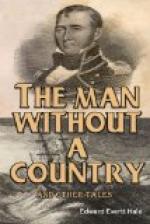Nolan thought he had got his chance. He had known her at Philadelphia, and at other places had met her, and this was a Godsend. You could not talk in contra-dances, as you do in cotillons, or even in the pauses of waltzing; but there were chances for tongues and sounds, as well as for eyes and blushes. He began with her travels, and Europe, and Vesuvius, and the French; and then, when they had worked down, and had that long talking-time at the bottom of the set, he said, boldly,—a little pale, she said, as she told me the story, years after,—
“And what do you hear from home, Mrs. Graff?”
And that splendid creature looked through him. Jove! how she must have looked through him!
“Home!! Mr. Nolan!!! I thought you were the man who never wanted to hear of home again!”—and she walked directly up the deck to her husband, and left poor Nolan alone, as he always was.—He did not dance again.
I cannot give any history of him in order; nobody can now; and, indeed, I am not trying to. These are the traditions, which I sort out, as I believe them, from the myths which have been told about this man for forty years. The lies that have been told about him are legion. The fellows used to say he was the “Iron Mask”; and poor George Pons went to his grave in the belief that this was the author of “Junius,” who was being punished for his celebrated libel on Thomas Jefferson. Pons was not very strong in the historical line. A happier story than either of these I have told is of the War. That came along soon after. I have heard this affair told in three or four ways,—and, indeed, it may have happened more than once. But which ship it was on I cannot tell. However, in one, at least, of the great frigate-duels with the English, in which the navy was really baptized, it happened that a round-shot from the enemy entered one of our ports square, and took right down the officer of the gun himself, and almost every man of the gun’s crew. Now you may say what you choose about courage, but that is not a nice thing to see. But, as the men who were not killed picked themselves up, and as they and the surgeon’s people were carrying off the bodies, there appeared Nolan, in his shirt-sleeves, with the rammer in his hand, and, just as if he had been the officer, told them off with authority,—who should go to the cockpit with the wounded men, who should stay with him,—perfectly cheery, and with that way which makes men feel sure all is right and is going to be right. And he finished loading the gun with his own hands, aimed it, and bade the men fire. And there he stayed, captain of that gun, keeping those fellows in spirits, till the enemy struck,—sitting on the carriage while the gun was cooling, though he was exposed all the time,—showing them easier ways to handle heavy shot,—making the raw hands laugh at their own blunders,—and when the gun cooled again, getting it loaded and fired twice as often as any other gun on the ship. The captain walked forward by way of encouraging the men, and Nolan touched his hat and said,—




